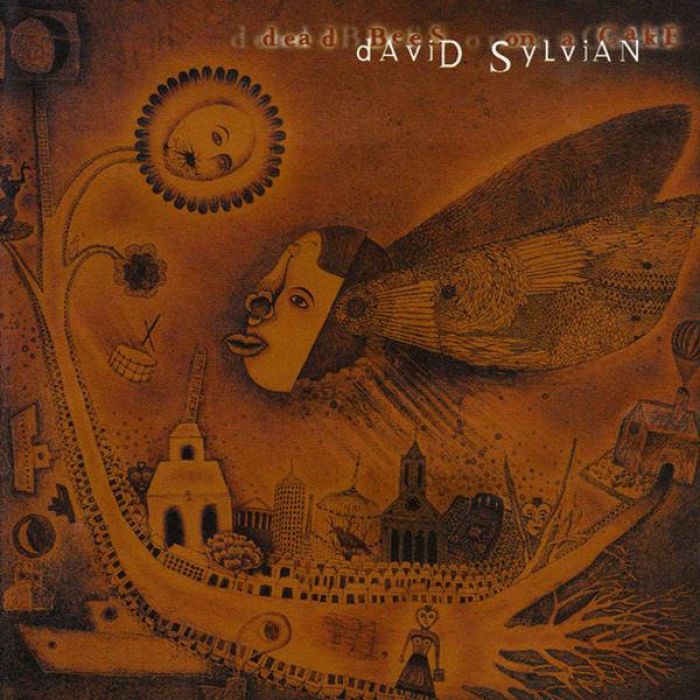Dead Bees on a Cake by David Sylvian (Review)

When the first couple of adjectives people use to describe your music include words like “artsy,” “debonair,” and “sophisticated,” you know you’re going to be walking a fine line. It could be so easy to wallow in artistic indulgence, adding orchestras, exotic influences, and verbose poetry. If you pull it off, you create music that’s as “artsy” as it can be, without losing its emotional beauty. On the other hand, you wander into that wonderful world of “free jazz,” where the music is heralded as genius, but is barely listenable.
Or, to put it another way, you could create a movie like Children of Nature, a very artistically pleasing film, but also one with great emotional depth. Or you could create a movie like The Thin Red Line, that for all of it’s aesthetic and visual beauty, nearly drowns in its director’s license.
It’s a very fine line, and it’s one that David Sylvian walks with incredible poise and balance. For much of the time, Dead Bees on a Cake is an obtuse masterpiece, a very intimate look into one man’s loves and longings. But then, there are the times when Sylvian gets a little too jiggy with being artistic, taking license while losing sight of the emotional impact.
The perfect listening environment to this album is late at night, preferably after midnight. Turn all the lights down low, or better yet, light a candle or two. You’re tired, but too tired to go to sleep. Instead, you just lie there on your bed, or if you’re like me, stare at your computer screen. Then Sylvian’s soft, breathy crooning just washes over you. The lyrics he sings are very personal, revealing in no uncertain terms very moving portraits of his wife, his family, and his beliefs.
On “I Surrender,” which funnels dark string arrangements and gentle piano melodies through an urban R&B filter and slightly hip-hop beat, Sylvian croons “I stand too close to see the sleight of hand/how she found this child inside the frightened man.” But there are also words that skirt the line between the poetic and the insipid (“we lose ourselves in inner cities in the hope of re-defining the space that surrounds us or the emptiness within”). We know you’re introspective, Mr. Sylvian. There’s no need to try.
But even when his lyrics are at their most “poetic,” the music is almost always able to bear its lyrical weight. Ranging from the sparse acoustic guitars and distant ambient textures of “Dobro #1” to the bluesy droning “Thalheim” (with one of the most atmospheric uses of the wah pedal I’ve ever heard), the sonic palette that Sylvian uses is broad and deep. He prefers to tease the listener, using textures and filigrees around the edges of the song to tantalize you. “Cafe Europa” sounds like a journey through Hong Kong nightclubs and lounges at 2:00 in the morning, whereas Sylvian uses soft, muted waves of guitars and electronics on “Praise” and “Darkest Dreaming,” accentuating the warbling chant of Shree Maa (Sylvian’s guru) on the former and the tenderness of Sylvian’s lyrics on the latter.
But on songs like “God Man” or “Pollen Path,” which sound too rambunctious and in-your-face for an album consisting primarily of tender ballads, Sylvian’s touch wavers a little bit. But they’re nothing like “All Of My Mother’s Names,” which starts off with Indian percussion and disorienting textures, but then descends into an annoying maze of avant-garde jazz and jagged guitar textures for over 6 minutes.
Is Sylvian too artsy for his own good? I wouldn’t say that. In fact, I think his music is part of a trend that needs to come back to popular music with a vengeance, that of lyrical, intelligent music. I’ll take Sylvian’s excesses any day over, because I know there’s a sensitive mind at work here, one that takes what he does with great seriousness and openness. The result is an album that, while it can be obtuse at first, and has its pretentious moments, is ultimately a great reward for the listener.
One other thing: The sleeve art is some of the most gorgeous I’ve ever seen, and is a perfect package for the music.